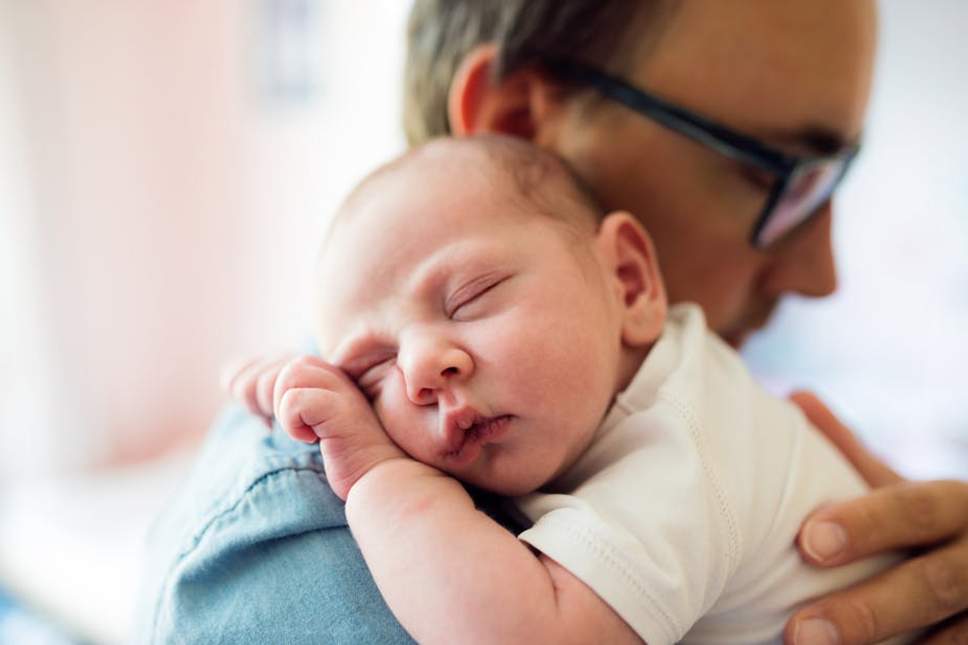
ONE in ten men will suffer from feelings of depression after their partners give birth a charity has found, as a new initiative is launched to give more support to new fathers.
According to research by Fathers Network Scotland, it is believed that between 7% and 10% of new dads exhibit levels of depressive symptoms, but from a survey of 564 dads in Scotland, only 16% were asked about their mental health during routine antenatal appointments.
As a result, the Scottish Government has launched the How Are You Dad? initiative, which aims to increase understanding by practitioners and NHS maternity staff of fathers’ perinatal mental health, and the impact this has on children and families.
For fathers like Chris Duke, the news of steps towards better support of new dads in Scotland is highly welcomed.
After the birth of his eldest daughter, Chris struggled to cope mentally, but kept it a secret from his family for fears of being judged as a ‘failing’ father.
“It was a bit of a unique situation because when my eldest was born, she was literally born the day after our wedding, so my life changed overnight,” he said.
“I was a single man, with no kids, to married with children in 24 hours, so it was a little overwhelming.
“I was brought up in a family where the dad was the breadwinner of the household, the dad was the ‘man of the house,’ the strongest person in the household, all that typical man stuff, and I wasn’t that.
“I had recently lost my job, we were on benefits, I don’t do DIY, I was incredibly overweight (I was 25 stone, I am now 13) and in my eyes, I was failing as a dad.
“This led me to distance myself from my family – I didn’t bond with my daughters when they were born and generally felt like a failure.”
Although it is generally women who are the main focus of postnatal depression (PND) sufferers, emerging research by Fathers Network Scotland has revealed that the mental health of new mothers and fathers is intimately linked.
Director of Fathers Network Scotland, Dave Devenney said: “Research around dad’s perinatal mental health was scarce to find and we believed that this was a critical area that had a potential impact for the whole family.
“We believe that the mental health of both mothers and fathers is closely intertwined. If a father is supportive his partner is less likely to become ill and more likely to recover quickly if they do.
“Also, the NHS is beginning to realise that not only do men have postnatal issue too but that the wellbeing of new mothers is largely dependent on the supporting skills and capacities of their children’s fathers.”
Further research by Fathers Network Scotland found that 92% of dads attended routine antenatal appointments with their partner but 61% said their role as a father was never discussed. 15% were never addressed by their name.
Despite these findings which show a much greater focus on the wellbeing of the mother, Chris believes that the pressure on fathers after the birth of a child is equal to that of the mother, so they should be given equal support both pre and post childbirth.
He said: “There is a lot of pressure on a dad at the beginning of a child’s life.
“People think that PND is based on the fact that the man is no longer getting the attention that the wife once gave him. But I don’t believe this to be true.
“I believe the pressure on men when a child is born is equal to that of the mother. In a different way, but it is there.”
Fathers Network Scotland is running four How Are You Dad? pilot and training schemes in Glasgow in mid-April, Tayside in mid-March and Lothian in April, to urge midwifes and health visitors to look out for the signs of paternal postnatal depression and ask dads how they are doing.
The charity also hopes the focus will expand from ‘mother focused’ into the context of ‘family centred’ to include dads more thoroughly in the baby process.
Mr Devenney said: “I would like to see a change in NHS terminology that refers to fathers as ‘fathers’ rather than simply ‘woman’s partner’ or ‘mothers partner’.
“I would like to see dads routinely invited, enroled and encouraged to engage with their role as expectant dads.
“One reason that it hasn’t been tackled in the past, in my opinion is…no one asked them “How are you Dad?” Our project aims to change that.”
For those who have the potential to suffer from PND in fatherhood, this could mean a much healthier future.
As for Chris, he is using his experiences to create Lucy’s Blue Day, a book for children to try to remove the stigma of mental health in not just fathers, but anyone who experiences the condition.
He said: “I was brought up in a household where having a mental illness seemed to be a weakness.
“My dad, who, I should say, is one of the best dads out there, was ashamed that his teenage son was on anti-depressants (this has since changed, but that was just the time, people didn’t understand Mental Illness back then).
“I want to be in a world where the stigma of mental illness isn’t there anymore, and that is the message of Lucy’s Blue Day – it’s ok not to be ok.”

Enjoy the convenience of having The Sunday Post delivered as a digital ePaper straight to your smartphone, tablet or computer.
Subscribe for only £5.49 a month and enjoy all the benefits of the printed paper as a digital replica.
Subscribe